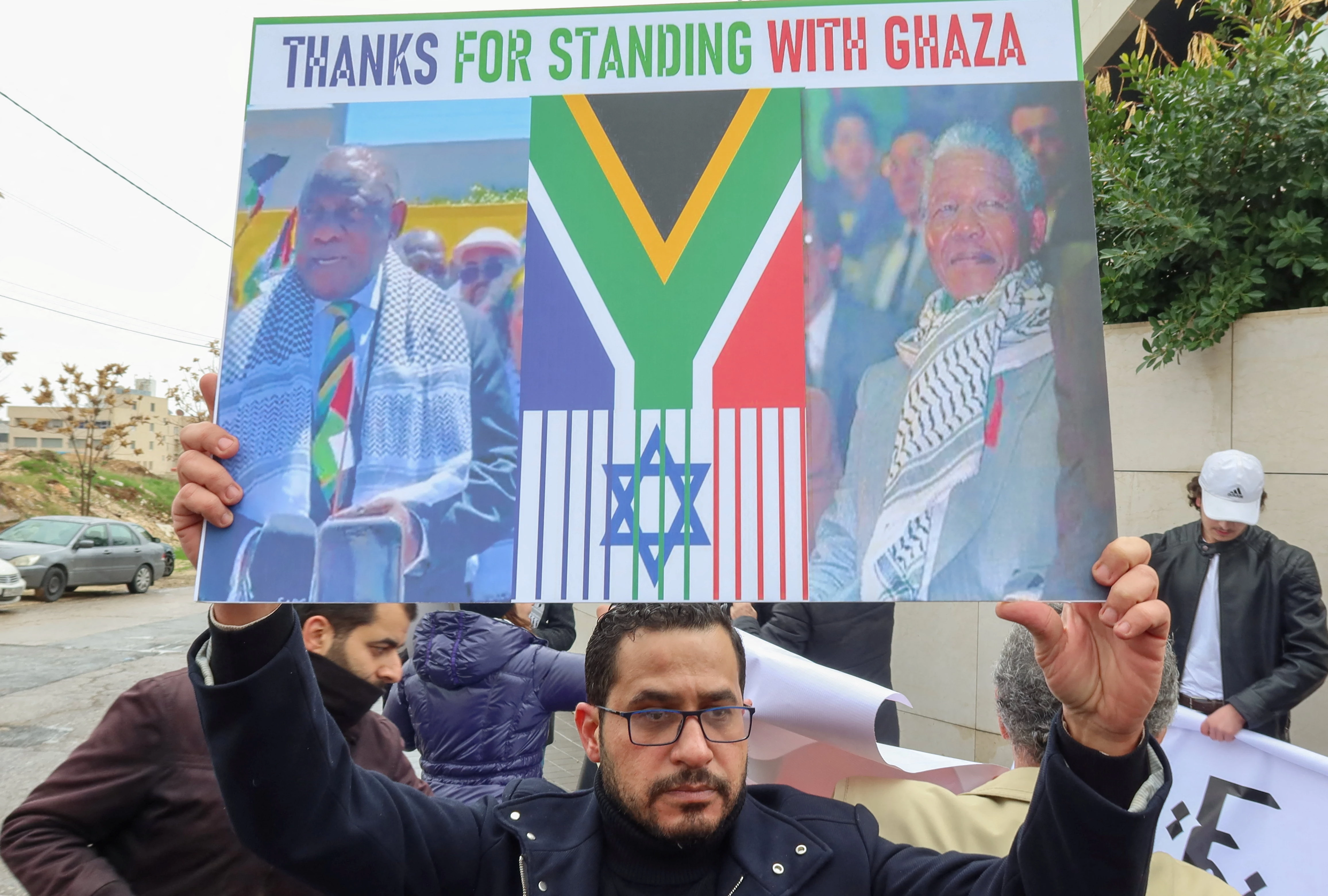Bravo South Africa

Stay tuned with 24 News HD Android App

In the hallowed halls of the UN International Court of Justice (ICJ), the world has been presented with damning evidence of what South Africa has termed a "live-streamed genocide" in Gaza. The allegations against Israel are not merely accusations; they are a haunting narrative of chilling intent, full awareness of civilian casualties, and what South Africa describes as "grave violence and genocidal acts."
As the case unfolds in The Hague, the evidence presented by South Africa is staggering. Photos of Palestinian mass graves, Israeli flags amidst the wreckage in Gaza, and videos allegedly depicting Prime Minister Benjamin Netanyahu endorsing genocide paint a grim picture. The atmosphere outside the court is febrile, reflecting the gravity of the situation.
South African lawyers argue that Israel's actions reveal a pattern of conduct and intention justifying a plausible claim of genocidal acts. The scale of destruction in Gaza, the intentional targeting of civilians, and the war's impact on children collectively point to an articulated intent to destroy Palestinian life. The evidence presented goes beyond mere military operations and accuses Israel of inflicting bodily and mental harm, displacement, dehydration, starvation, and an assault on the healthcare system.
The South African legal team emphasizes that genocides are never declared in advance, yet the evidence over the past 13 weeks paints an overwhelming and incontrovertible picture of genocidal intent. The stakes are high, and South Africa urges the judges to order an immediate ceasefire.
What is perhaps equally troubling is the criminal silence enveloping the world in the face of these severe allegations. As the ICJ witnesses the unfolding of what could be a landmark case, the major powers and international players seem hesitant to confront the issue head-on. The absence of a swift and unified response raises profound questions about the commitment of these nations to human rights and global peace.
The Muslim world's response, or lack thereof, is particularly notable. The genius act of genocide in Gaza should have triggered a robust and collective stance from Muslim-majority nations. However, the perceived poor response highlights the challenges of achieving meaningful solidarity within the Muslim world during times of crisis.
The Arab League and the Organization of Islamic Cooperation's symbolic support neither showed effective response by themselves nor diverted international attention to this grave situation, which is highly objectionable and thus is a big question mark
The ICJ's role in this matter is crucial. Unlike the International Criminal Court, the ICJ tries states, not individuals. South Africa's plea for provisional measures, aiming to reach a decision as soon as possible, adds urgency to the proceedings. An adverse ruling for Israel could increase political pressure and potentially serve as a rationale for sanction
In this dire moment, the international community must reflect on its commitment to justice, human rights, and the prevention of atrocities. The allegations against Israel demand a transparent and impartial investigation, with major powers taking responsibility for their role in ensuring global peace. The world cannot afford to remain silent in the face of what South Africa contends is a live-streamed genocide. Seeking the truth and holding those responsible accountable is not just a legal imperative but a moral obligation for the international community.
Moreover, in the 21st century, the ongoing Israeli genocide and ethnic cleansing of innocent Palestinians serve as a poignant symbol of global indifference and political inertia in the face of a protracted humanitarian crisis. The International Court of Justice's recent hearing on South Africa's allegations of Israeli genocide in Gaza brought to light the chilling evidence of intentional destruction and violence, yet major political powers and global players have failed to mount a united and impactful response.
The United Nations, often seen as the bedrock of international cooperation, has encountered significant challenges in addressing the Israel-Gaza conflict. The Security Council's recurring deadlock reflects the geopolitical complexities that hinder collective action, allowing powerful nations to prioritize strategic alliances over moral imperatives. This not only raises questions about the efficacy of global institutions but also perpetuates the suffering of the Palestinian people.
Similarly, the Muslim world, with its substantial geopolitical influence and cultural ties to the Palestinians, has not lived up to expectations in providing a cohesive response. The absence of a united front among Muslim-majority nations underscores the limitations of regional alliances in addressing humanitarian crises.
Moreover, major powers, traditionally champions of human rights, have not exerted sufficient pressure on Israel to halt its actions. The reluctance to hold Israel accountable may be influenced by geopolitical considerations, economic interests, or strategic alliances, revealing a moral vacuum in global politics.
Despite advancements in communication and information dissemination, the plight of the Palestinians appears overlooked or intentionally sidelined by the international community. Social media platforms, catalysts for raising awareness, have not translated into effective diplomatic pressure or tangible actions to protect the vulnerable population in Gaza.
As the world witnesses the horrifying evidence of genocidal acts, the question arises: How can the international community, armed with evolved conflict resolution mechanisms, remain complacent in the face of such atrocities? The failure to address the ongoing crisis not only perpetuates the suffering of the Palestinian people but also undermines the credibility and effectiveness of global institutions.
In conclusion, the criminal silence and inadequate response from major political powers and global players in the 21st century paint a grim picture of the state of international affairs. The Palestinian genocide and ethnic cleansing demand urgent and concerted efforts from the international community to uphold the principles of justice, human rights, and peace. The failure to act decisively not only deepens the humanitarian crisis in Gaza but also raises concerns about the moral compass guiding global governance in the contemporary world.
